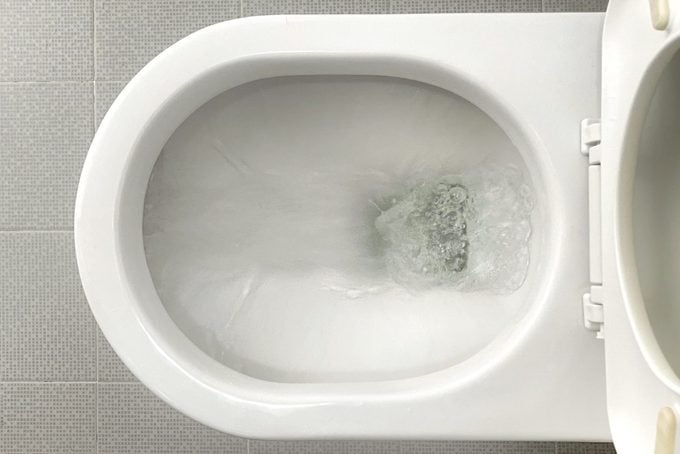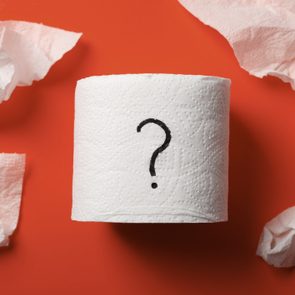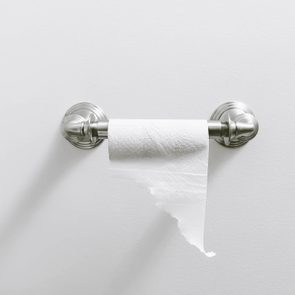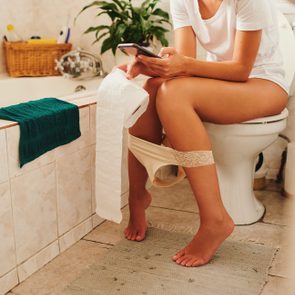Why Does Poop Float?
Updated: Sep. 28, 2022
Floating poop is often no big deal, perhaps caused by something you ate. But in some cases it can point to serious medical issues.
What is ‘normal’ poop?
When it comes to our bowel movements, no one wants to be abnormal: after all, if you’re “regular,” that’s a good thing. If you’ve ever wondered what normal stools should look like, there is actually a chart for that. The Bristol Stool Chart, first developed in Bristol, England, in 1997, rates stools on a scale of one to seven. Type one sits in your bowels for a long time and passes hard and lumpy. Not good. Type seven moves through quickly and comes out as liquid. Also, not good. Optimal stools are type three and four, says Angela Pham, MD, a board-certified gastroenterologist with University of Florida Health. Normal stools look “sausage or snake-like” according to the chart, and can occur daily. But even if your stool appears mostly normal, it’s often a good idea to discuss any concerns or curiosities—possibly including floating poop—with your doctor. So why does poop float?
Here is a closer look at this phenomenon, with expert insight on why poop floats, when to be concerned about it, and when to simply flush and forget.
Get The Healthy @Reader’s Digest newsletter
Why does poop float?
Frequent floating stool is often a sign of a malabsorption, according to Dr. Pham, an assistant professor in the UF Department of Medicine’s Division of Gastroenterology, Hepatology, and Nutrition. If that’s the case, it essentially means your small intestine can’t absorb nutrients or fat from food.
“When the body is unable to process and absorb fat, it appears in the stool, causing it to float,” she explains. “If malabsorption is occurring, a comprehensive evaluation should be done to search for the cause.”
People suffering from malabsorption can have floating, pale, greasy stools. They may see, or smell, oil droplets in the toilet or in their stool. This is a sign your body is not absorbing fat. Causes include lactose intolerance, genetics, and certain medications.
Serious digestive issues, including celiac disease, Crohn’s disease and even cystic fibrosis, can also lead to malabsorption, Dr. Pham notes.
Why a Low Residue Diet Could Help With Crohn’s, Colitis, and Other GI Problems

Irritable Bowel Syndrome might play a part
Irritable bowel syndrome (IBS) is associated with many intestinal issues, including frequent abdominal pain from diarrhea, constipation or both.
Symptoms of IBS and malabsorption can be similar, according to the International Foundation for Functional Gastrointestinal Disorders (IFFGD). Malabsorption may aggravate existing IBS disorders.
According to IFFGD, irritable bowel syndrome affects between 25 million and 45 million people in the United States. The exact cause of IBS is unknown, but it seems related to how the gut, brain and nervous system interact.
Floating stools are a common characteristic of IBS, according to research published in the European Journal of Gastroenterology & Hepatology. About one in four people with IBS reported frequent floating stools, the researchers found, while fewer than 3% in a control group without IBS reported the same frequency.
Guess What: Your Irritable Bowel Syndrome May Actually Be Caused By Food Sensitivities
When to seek medical advice
The occasional floater in your toilet bowl does not necessarily signal trouble. You likely need to adjust your diet, not seek medical attention.
“When you eat a high-fat diet, it creates gas (flatulence) in your intestines, which is absorbed into your stool and may cause it to float,” Dr. Pham says. Diets high in sugar, fiber, starch, and lactose can create the same issues.
But when floating stools become more frequent, it may be time to call your doctor.
“Chronic malabsorption can lead to severe malnutrition and serious complications,” Dr. Pham says. “There are some conditions that may require lifelong medical treatment and cannot be treated with home remedies.”
Ignoring the symptoms could be life-threatening.
“If the malabsorption is due to a condition such as inflammatory bowel disease, the complications could be as severe as bowel blockage or perforation,” Dr. Pham says.
A Gastroenterologist’s Surprising Best Way to Relieve Constipation
Treatment protocols
The best treatments for malabsorption tend to be avoiding triggers (dietary) and treating symptoms (diarrhea, constipation), according to an overview of malabsorption symptoms from the National Center for Biotechnology Information (NCBI).
If the issues are linked to celiac disease, Dr. Pham says eliminating all wheat products from the diet can help reverse damage to the intestines. Medications can help manage Crohn’s disease or colitis.
Boost your bacteria
Try to nurture a healthy community of bacteria in your intestines, where they serve as part of your gut microbiome. This community thrives or dies based on the foods we eat, Dr. Pham says.
Eating foods rich in prebiotics helps boost the growth of healthy microbes in your intestines.
A 2020 study conducted by the U.S. National Institute of Diabetes and Digestive and Kidney Diseases (NIDDK) concluded a healthy gut microbiome led to better nutrition absorption. In the long term, it helped boost the immune system to fight off colon cancer and other diseases.
“A short list of [optimal choices] includes leafy greens, artichokes, bananas, onions, and garlic,” Dr. Pham says. “In general, prebiotics are present in colorful, fiber-rich foods.”
And as a bonus, eating this kind of diet tends to benefit not just your digestive system, but the rest of your body, too.
For more wellness updates, follow The Healthy on Facebook, Instagram, and Twitter. Keep reading:
























